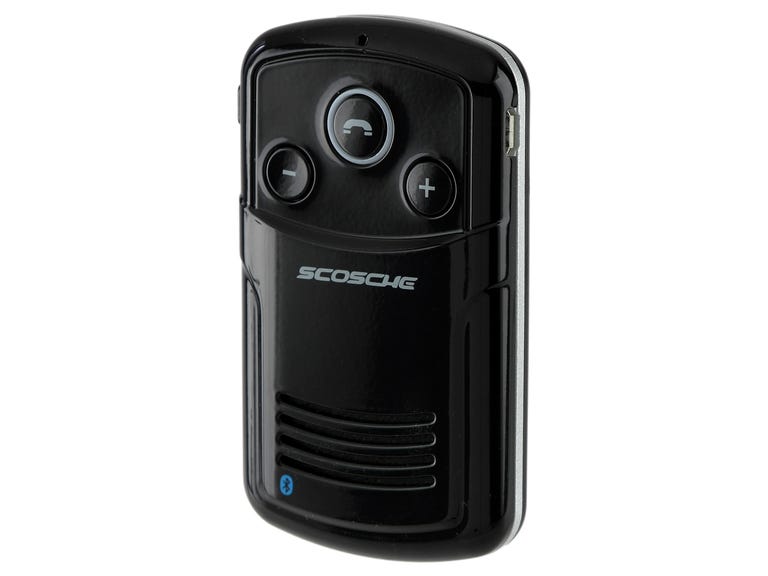 Why You Can Trust CNET
Why You Can Trust CNET Scosche SolChat solar-powered Bluetooth speakerphone review: Scosche SolChat solar-powered Bluetooth speakerphone
Scosche SolChat solar-powered Bluetooth speakerphone
The more gadgets we bring into our cars, the more cables end up strung down to 12-volt power points. Scosche's SolChat eliminates one of those cables by getting its power from the sun. The SolChat is a Bluetooth car speakerphone that lays claim to the "green" label by being solar powered. It's also one of the better applications of alternative energy in a consumer device that we've seen to date.
The Good
The Bad
The Bottom Line
When you first get the SolChat out of the box, you'll want to charge it using the traditional, corded route (a USB charging cable and car adapter also ship with the device). We initially charged the speakerphone via a USB port on a computer and it took about 3 hours to fully charge. According to Scosche, with a full battery you should get up to 12 hours of talk time and up to 450 hours of standby time. But if you leave your car out in the sun--and have the SolChat affixed to a visor or the windshield--the little solar panel on the device's backside collects sunlight to continuously charge the unit's internal lithium ion battery. A windshield suction-cup mount and sun visor clip are included.
What's nice about this setup is that as long as the sun is shining, you'll be able to just leave the SolChat attached to your windshield (or visor) and not have to worry about having any cables running to the cigarette lighter in your dashboard panel. And at 3.5 inches by 2 inches by 0.5 inch, it remains pretty unobtrusive; it's not much bigger than the registration sticker you affix to the inside of your windshield.
The SolChat has some built-in voice features, including "voice announce," which is the equivalent voice caller ID. However, to use this feature and have the SolChat announce a caller by name, you have to transfer your contacts (via Bluetooth) from your cell phone to the SolChat. Note: Not all cell phones offer Bluetooth transfer of contacts.
If you don't have the caller stored in your SolChat, a recorded female voice will simply say, "Incoming call," and start saying the incoming number when your cell phone rings in the car (you touch the main button on the speakerphone to accept the call or hold it down for three seconds to reject it). This model also supports voice dialing so long as your mobile phone supports it (and you have it set up with the contacts on your phone). To voice dial, you tap the speakerphone button once and say a contact's name to have your phone dial the number.
We also like that once you set up a pairing between your cell phone and SolChat, they automatically connect when you enter your car and turn on the speakerphone. SolChat automatically turns off once the pairing is broken and that same female voice tells you the pairing has been broken and that the unit is shutting down.
In terms of performance, we didn't have any major complaints. The speakerphone was definitely loud enough on our end. In our test calls in the car, most callers said they could hear us "pretty well," though there was some slight echoing (on their end) and occasionally we were asked to repeat something we'd just said.
Scosche isn't the only manufacturer making solar-charging Bluetooth speakerphones. To name a few competitors, you have Iqua's Vizor SUN Solar Powered Bluetooth Car Kit, Anycom's SCK-200 Hands-Free Solar Powered Bluetooth Speakerphone, and LG's HFB-500. They all retail in the $60 to $100 range, fit in a pocket, and have similar features, though not necessarily voice announce.
Of those competitors, we've only reviewed the LG and the SCK-200's predecessor, the Anycom SCK-1. We give the edge to the LG because of its capability to connect to two Bluetooth devices simultaneously. But if that's not a concern--and if you can get it for 20 percent to 25 percent off its list price of $100--the Scosche SolChat is certainly worthy of consideration.


